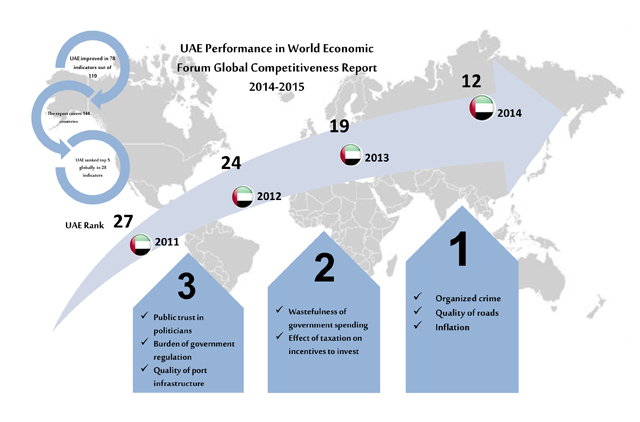Dubai: The World Economic Forum (WEF) named the United Arab Emirates the 12th most competitive nation globally for 2014-2015, a jump of seven ranks from last year.
That ranking puts it ahead of countries such as Canada, Denmark and South Korea. The nation also leads all the Middle East and North African (MENA) countries.
The UAE ranks first for the absence of inflation and the absence of organised crime globally, second for the effectiveness of government spending and third in terms of absence of government bureaucracy. It also rated as having the third best infrastructure in the world.
Indicators
According to the report, the UAE has made a remarkable progress in 78 sub-indicators during just one year.
His Highness Shaikh Mohammad Bin Rashid Al Maktoum, UAE Vice President and Prime Minister and Ruler of Dubai, said in a statement: “The UAE, under the leadership of President His Highness Shaikh Khalifa Bin Zayed Al Nahyan, is advancing steadily and dramatically across development indicators, reflecting the areas where our economy is progressing ... notably, security and stability indicators are among the best in the world... and the welfare of our citizens is our first priority.”
Shaikh Mohammad also added that the UAE government is constantly monitoring these global indicators issued by reputable international organisations. “Retreating is not an option in our government.”
“Despite the many challenges facing our region, our main focus has been, and will remain on progressing in our nation, and developing our economy for the on-going welfare of our citizens. Our message to those around us is that the key to true stability lies in the creation of real development,” he said.
He commented that the UAE has progressed in several areas because of the hard work of federal and local teams who are working as one, equipped with a vision that extends to the year 2021.
”Our agendas and sector strategies change continuously as our ambitions keep growing,” he said.
Teamwork
Reem Al Hashemi, Minister of State, and Chairwoman of the Emirates Competitiveness Council (ECC), commended the efforts made by federal and local government organisations to step up performance of the UAE’s competitiveness.
Reem said efforts by different government teams led to the significant improvement in results of competitiveness indicators, with quality of the country’s public institutions climbing four ranks from last year to become the 7th globally.
“This report is an international testimony to the UAE’s global lead and position among the world’s most advanced and innovative countries and this achievement could have not been achieved without the vision of our leadership who aspires to realise the ultimate goal of the UAE Vision 2021 of making UAE the best country in the world by 2021,” she said.
She added, saying: “I thank all individual and organisations who contributed in supporting UAE’s competitiveness, as well as the teams in different government institutions. All government institutions deserve to be commended for working together to achieve this remarkable result.”
More challenges
Abdullah Lootah, ECC Secretary General, said the surge in the country’s ranking year by year comes with more challenges to maintain this lead.
“We have a lot to do in holding this top position and in doing better. We will step up our efforts and work with the concerned institutions to ensure that the UAE remains in the top all the time,” he added.
Rankings of competitiveness in the Global Competitiveness Report (GCR) are determined by two main factors: the Executive Opinion Survey and the data measuring performance of countries in vital areas such as healthcare, education, market size, patents, research and innovation programmes.
Lootah underlined the important role of the private sector in improving the country’s competitiveness rankings.
The ECC maintains a constant interaction with national and international companies, chambers and business councils in the UAE such as the British and French business councils.
Comprehensive assessment
The GCR assesses the competitiveness landscape of different world economies, providing insight into the drivers of their productivity and prosperity.
The report series remains the most comprehensive assessment of national competitiveness worldwide.
In the WEF report, the UAE also was ranked second globally for government procurement of advanced technology, for the effectiveness of government spending, and for the impact of taxes on investment and the lack of trade barriers. It also ranks second for the quality of its infrastructure in the aviation sector.
The UAE ranked third globally on indicators such as citizens’ confidence in government and leadership, the absence of government bureaucracy, the quality of ports, efficiency of customs procedures and attracting technology through foreign direct investment.
Significantly, for the knowledge economy, UAE ranked 3rd globally for attracting professional talent.
The UAE showed significant success in all overarching pillars of the report, over the last year. It ranked 2nd, up from 4th, in Basic Requirements which measures the readiness of regulations and institutions, infrastructure, health and primary education.
In Efficiency Enhancers, which evaluates the efficiency and effectiveness of higher education systems, labour market, financial market and technological readiness, the UAE ranked 14th globally, up from 20th. It also moved up to 21st from 24th in Innovation and Sophistication.
The GCR assesses 144 countries on their ability to provide high levels of prosperity and welfare to its citizens, along a series of performance indicators which evaluates the country’s ability to provide suitable infrastructure for investments.













